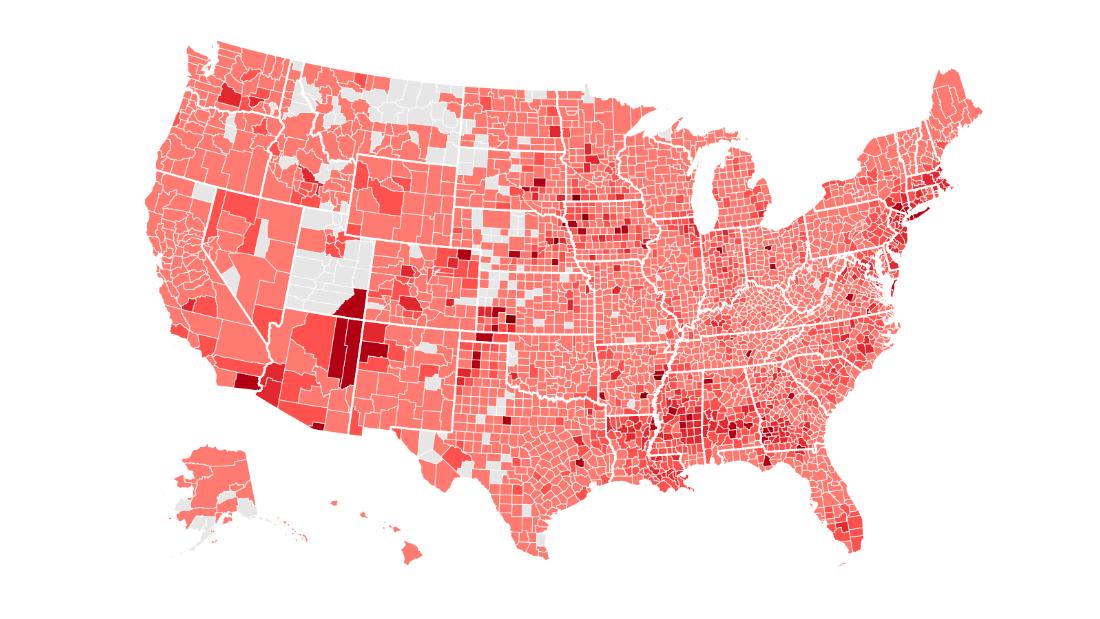Germany sees "alarming" rise in infections
From CNN's Fred Pleitgen in Berlin
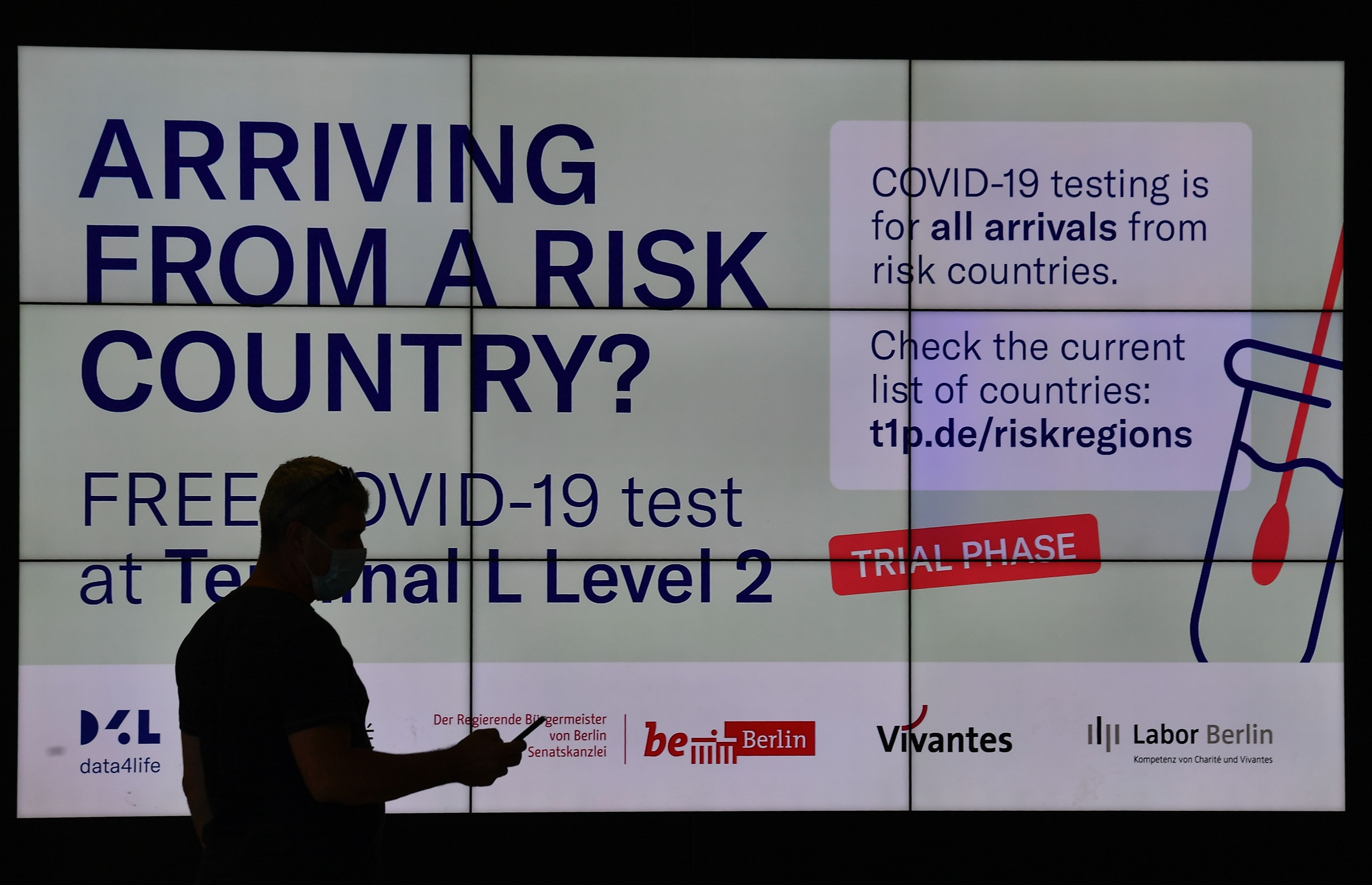 Germany is offering free Covid-19 tests for travelers coming from abroad. Tobias Schwarz/AFP/Getty Images
Germany is offering free Covid-19 tests for travelers coming from abroad. Tobias Schwarz/AFP/Getty ImagesGermany has on Friday recorded the highest number of new daily infections since early May, according to data published Saturday by Germany’s center for disease prevention, The Robert-Koch Institute.
The country saw 955 new coronavirus cases. The last time Germany recorded a higher number was May 9.
The pandemic had largely been brought under control in Germany earlier this summer, but the government has been warning about new outbreaks of the disease in recent weeks.
The Robert-Koch Institute said laxer enforcement of distancing and hygiene rules, as well as travelers returning from abroad are to blame for the steep rise in cases.
"The number of 955 new infections is alarming. Especially since it is not large 'hot spots' but smaller clusters of infections," Germany's economy minister Peter Altmaier said on Twitter on Saturday. "The main risks need to clearly be named so that more targeted prevention becomes possible," he added.
Starting Saturday everyone coming to Germany will be able to get a free coronavirus test within 72 hours of arrival, according to a new directive from Germany’s health ministry.
US coronavirus daily death totals topped 1,000 on 10 days in July
From CNN's Alta Spells
During the month of July, the United States' coronavirus daily death totals exceeded 1,000 on 10 occasions, according to data gathered by Johns Hopkins University (JHU).
In June, the number of daily deaths topped 1,000 on three out of 30 days, representing a drop from previous months, JHU records show.
During May, daily death totals were greater than 1,000 on 23 of the 31 days.
In April, the number of deaths reported each day exceeded 1,000 for each of the 30 days of the month, with 17 days reporting more than 2,000 deaths according to data from JHU.
The highest recorded daily death total in the US is 2,614 set on April 17, according to information compiled by JHU.
Here's July's breakdown:
India reports highest 24-hour increase in coronavirus cases, with over 57,000 new infections
From CNN's Swati Gupta
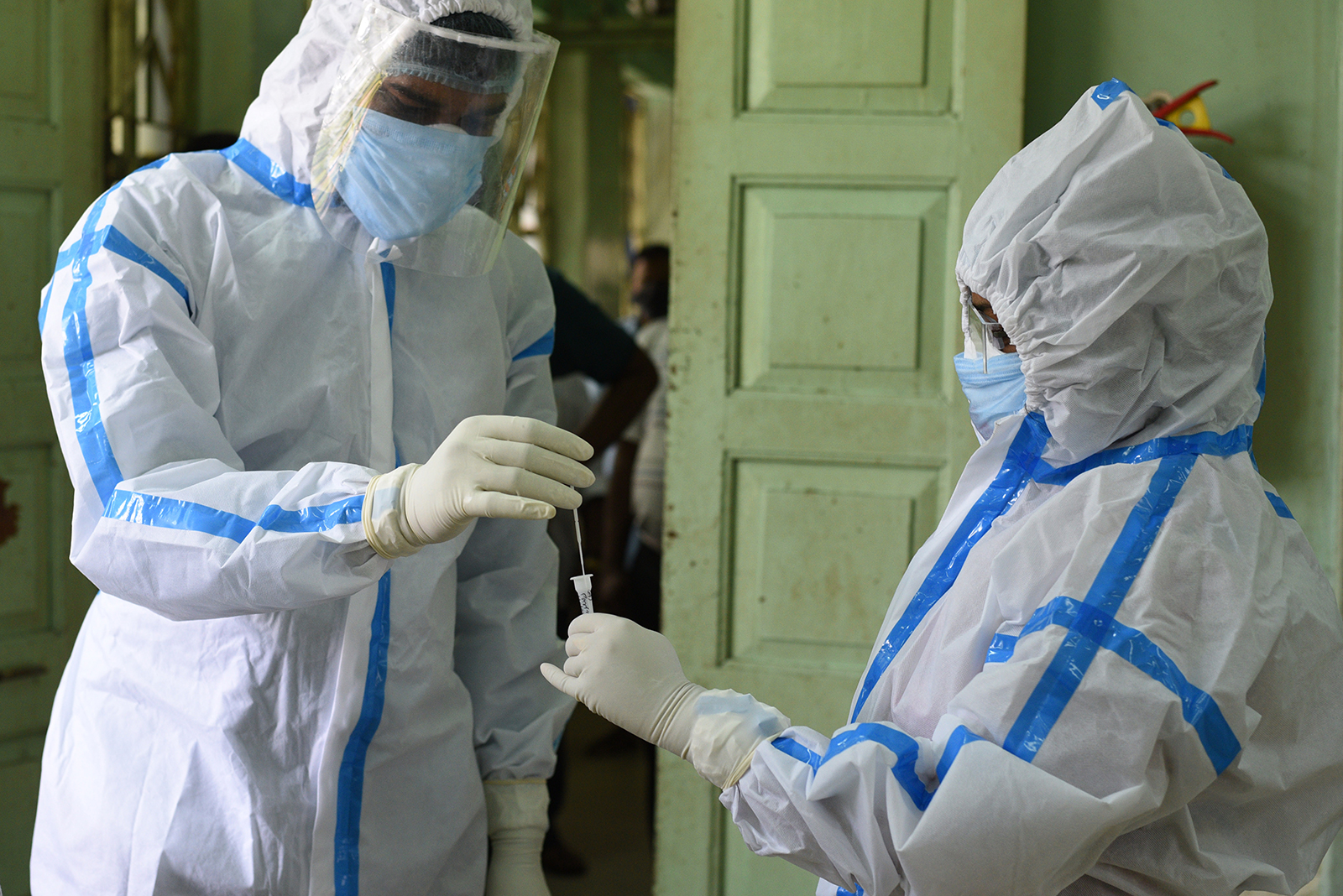 Health workers collect swab sample for Covid-19 tests in Kolkata, India on July 31. Samir Jana/Hindustan Times/Getty Images
Health workers collect swab sample for Covid-19 tests in Kolkata, India on July 31. Samir Jana/Hindustan Times/Getty ImagesIndia reported 57,118 new coronavirus cases in the past 24 hours, its highest daily increase to date, according to the Ministry of Health and Family Welfare.
As of this morning, India had a total of 1,695,988 confirmed cases of Covid-19, of which more than 565,000 are active cases.
The total number of recovered patients stands at over 1 million.
At least 36,511 people have died from the virus across the country, according to the health ministry.
The Indian Council of Medical Research said that they have tested more than 19.3 million samples.
A variety of responses by US states hurt the country's ability to contain the coronavirus pandemic, Fauci says
From Madeline Holcombe and Dakin Andone
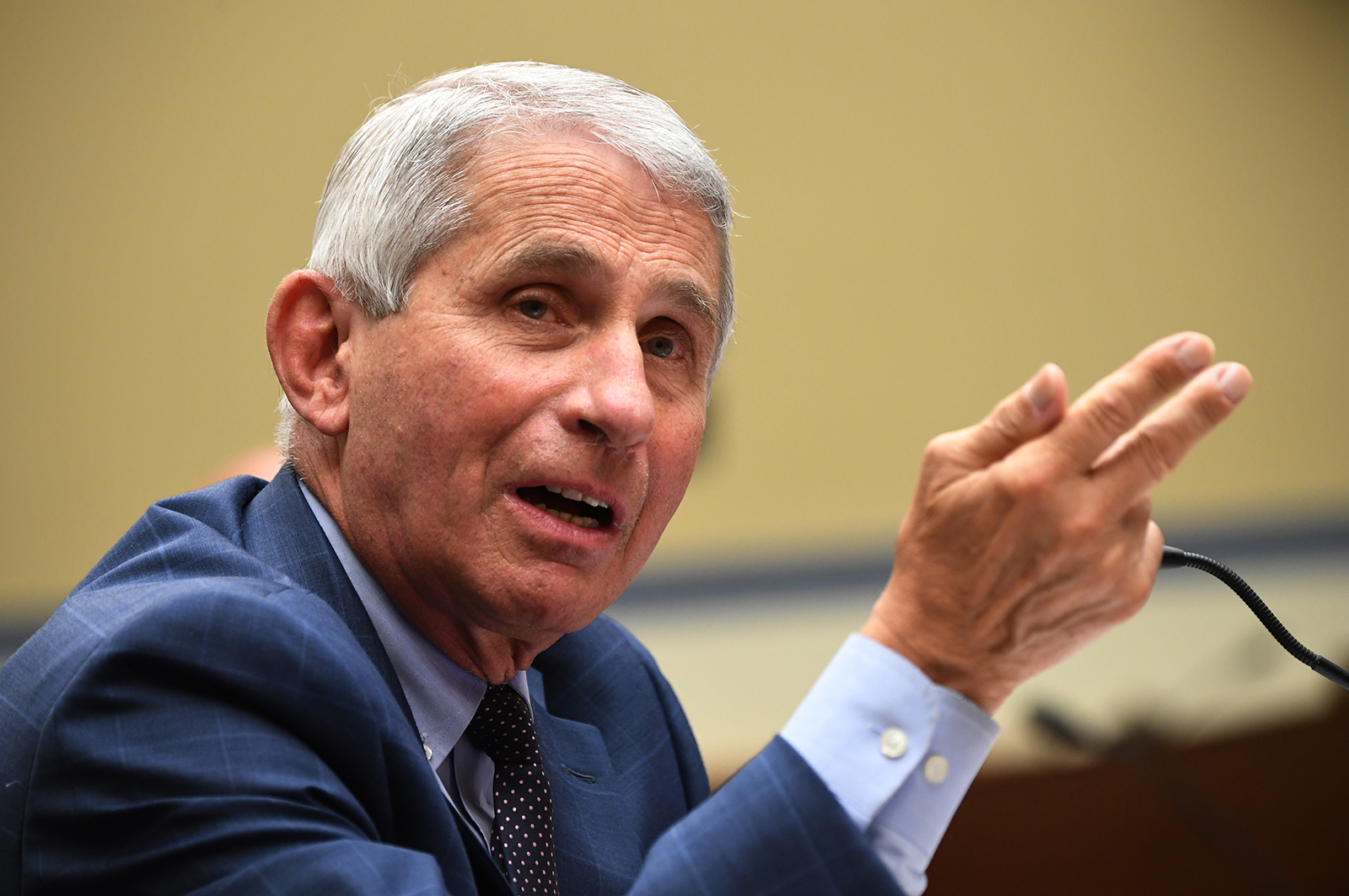 Dr. Anthony Fauci, director of the National Institute for Allergy and Infectious Diseases, testifies on Capitol Hill in Washington, DC on July 31. Kevin Dietsch/AFP/Getty Images
Dr. Anthony Fauci, director of the National Institute for Allergy and Infectious Diseases, testifies on Capitol Hill in Washington, DC on July 31. Kevin Dietsch/AFP/Getty ImagesThe "diversity of response" by US states hampered the country's ability to contain the spread of the coronavirus, Dr. Anthony Fauci said at a congressional hearing on Friday, as the number of cases in the US topped 4.5 million.
When asked why Europe appears to have been more effective at controlling the spread of the virus, the nation's top infectious disease expert said that it might have helped that about 95% of Europe had shut down much earlier.
"When you actually look at what we did -- even though we shut down, even though it created a great deal of difficulty -- we really functionally shut down only about 50% in the sense of the totality of the country," Fauci, director of the National Institute of Allergy and Infectious Disease, said in response to a question from Rep. Jim Clyburn of South Carolina.
Some states also followed reopening guidelines more closely than others, Fauci added, saying, "There are some states that did it very well and some states that did not."
"I think there was such a diversity of response in this country from different states that we really did not have a unified bringing everything down," he added later, in response to a similar question from Rep. Jamie Raskin of Maryland.
Frontline workers wearing PPE still at more than three times the risk of Covid-19 infection, new study finds
From CNN's Shelby Lin Erdman
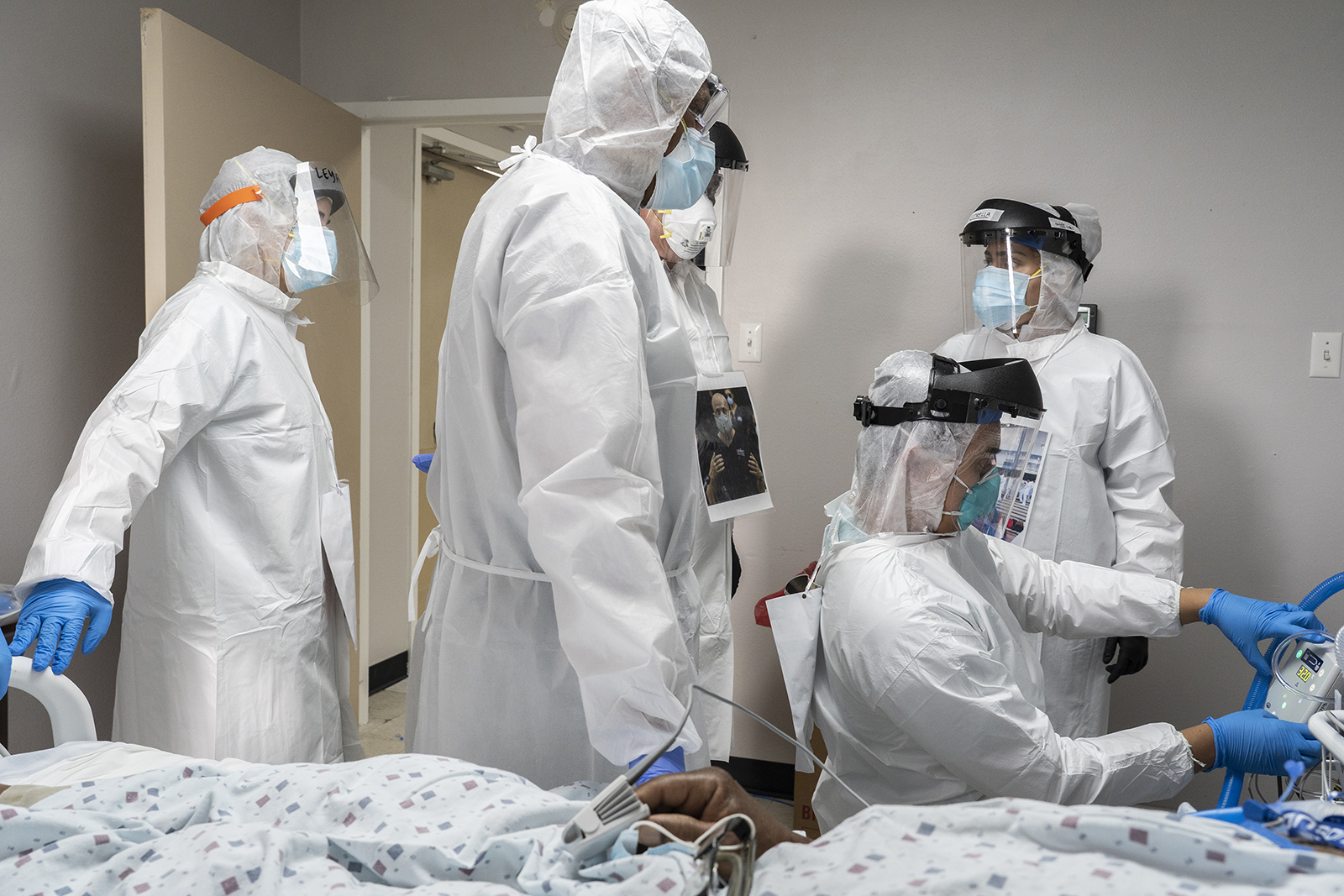 Doctors and nurses wearing protective gear treat a patient in the Covid-19 intensive care unit at a hospital in Houston, Texas on June 29. Go Nakamura/Bloomberg/Getty Images
Doctors and nurses wearing protective gear treat a patient in the Covid-19 intensive care unit at a hospital in Houston, Texas on June 29. Go Nakamura/Bloomberg/Getty ImagesWearing personal protective equipment (PPE) when caring for patients with Covid-19 isn't enough to completely eliminate the threat from the virus for frontline workers, according to a new study from King's College London.
Health care workers with adequate gloves, gowns and face masks still had 3.4 times the risk of contracting the coronavirus compared to the general population, the study found, and minority health care workers had an even greater risk of testing positive.
African American, Latino and other minority care providers were five times more likely to contract Covid-19 than their White counterparts, the study found.
"A little over 20 percent of front-line health-care workers reported at least one symptom associated with SARS-CoV-2 infection compared with 14.4 percent of the general population; fatigue, loss of smell or taste, and hoarse voice were especially frequent," the researchers wrote.
The researchers used the COVID Symptom Tracker app to study the data of more than 2 million people, including almost 100,000 frontline health care workers in the United States and the United Kingdom between March 24 and April 23.
They found more than 2,700 cases of Covid-19 per 100,000 healthcare workers compared with just over 240 cases per 100,000 among the general population.
Researchers publish scathing critique of a hydroxychloroquine study touted by the White House
From CNN's Elizabeth Cohen
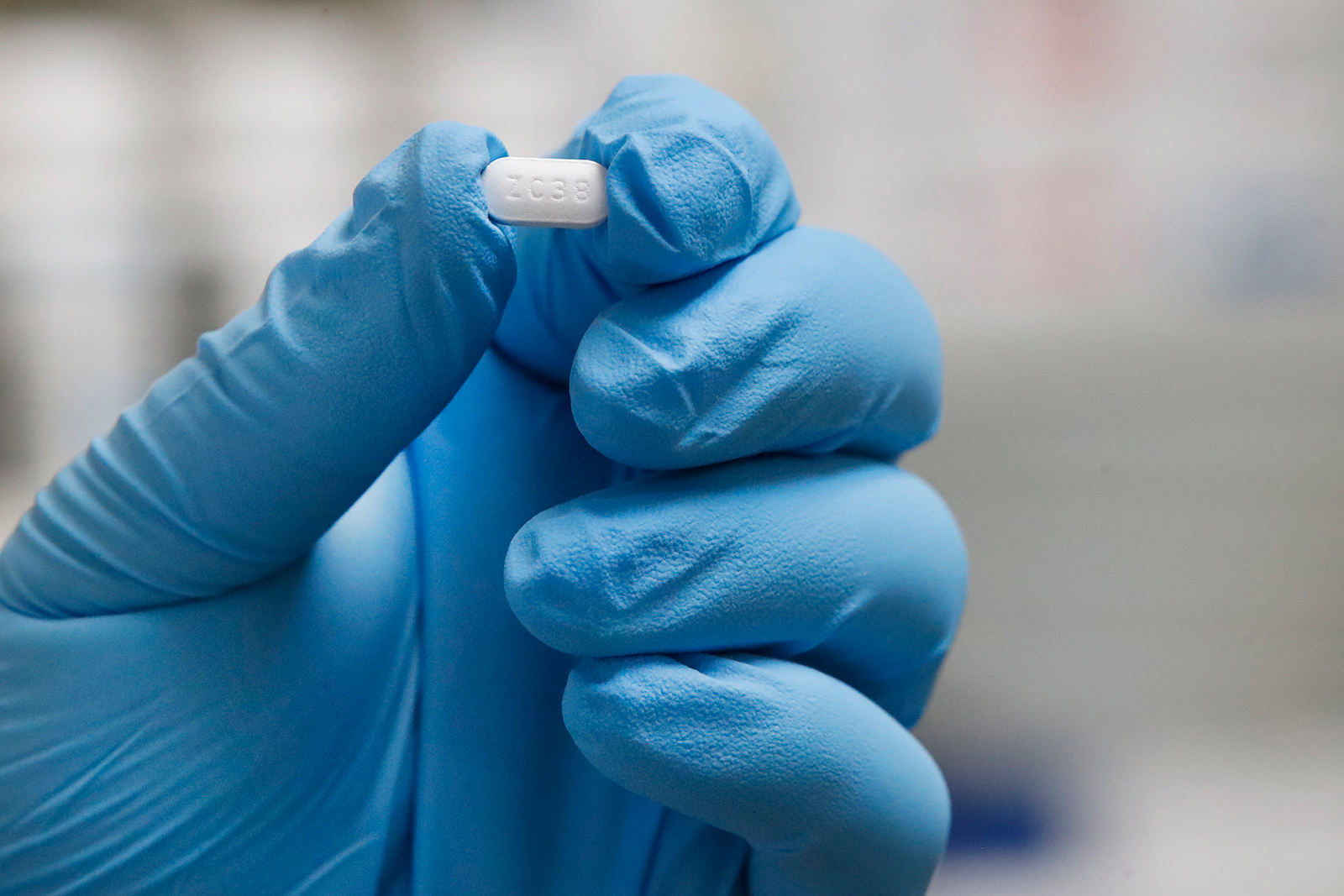 A pharmacy tech holds a pill of hydroxychloroquine at Rock Canyon Pharmacy in Provo, Utah, on May 20. George Frey/AFP/Getty Images
A pharmacy tech holds a pill of hydroxychloroquine at Rock Canyon Pharmacy in Provo, Utah, on May 20. George Frey/AFP/Getty ImagesResearchers on Wednesday published scathing critiques of a study President Trump repeatedly touted on Twitter. That study, published earlier this month in the International Journal of Infectious Diseases, claimed to show that hydroxychloroquine saved lives.
President Trump tweeted about it enthusiastically.
"The highly respected Henry Ford Health System just reported, based on a large sampling, that HYDROXYCHLOROQUINE cut the death rate in certain sick patients very significantly. The Dems disparaged it for political reasons (me!). Disgraceful. Act now," the President tweeted on July 6.
But the study had multiple errors, flaws and biases, according to letters to the journal's editors.
"As a result of the flaws in the analysis the conclusions reached in [the study] are invalid," Graham Atkinson, an independent consultant in health care policy, wrote in one of the letters.
The study was conducted at the Henry Ford Health System in Detroit. It contradicts many other studies, which have found the drug does not help Covid-19 patients.
US reports more than 67,000 coronavirus cases
From CNN's Alta Spells
The United States reported 67,023 new coronavirus cases and 1,259 new deaths on Friday, according to Johns Hopkins University.
There are at least 4,562,038 Covid-19 infections in the US and at least 153,314 people have died.
The totals include cases from all 50 states, the District of Columbia and other US territories, as well as repatriated cases.
CNN's map is tracking the US cases:
Japan sees highest daily coronavirus infections for a third day in a row
From CNN's Junko Ogura
Japan reported 1,579 new Covid-19 cases and five deaths on Friday, according to the health ministry.
It's the third day in a row that the country has reported its highest daily infections.
The total number of confirmed cases in Japan stands at 36,548, with 712 from the Diamond Princess cruise ship. There have been 1,024 deaths, with 13 from the cruise ship.
"We will conduct tests extensively to detect and treat virus carriers. Preventing aggravation of illness is also extremely important," he said.
The capital Tokyo also reported its highest daily increase on Friday, with 463 cases. That brings the total number of infections in the city to 12,691, with more than half of those from July.
Koike urged Tokyo residents to avoid unnecessary trips in summer holiday in August.
Leading medical journal calls widespread false information on the coronavirus a “threat to public health”
From CNN Health’s Shelby Lin Erdman
Widespread disinformation about the coronavirus pandemic fueled by the internet “has resulted in difficulties in discerning truth from fiction” and is a growing problem, The Lancet wrote in an editorial published on Friday.
“This so-called infodemic, defined by World Health Organzation as an “overabundance of information -- some accurate and some not -- that makes it harder for people to find trustworthy sources and reliable guidance when needed,” has become a major threat to public health,” the leading medical journal wrote.
The Lancet compared dealing with “the infodemic” to the difficulty with handling the coronavirus pandemic itself.
It’s causing a “growing mistrust in science and experts” and “poor and confusing responses by political and government leaders,” the journal wrote, pointing out that the problem is compounded by some people’s use of social media as their only source of information.
The publication described those spreading misinformation on Covid-19 as “highly organized political or pseudoscientific bodies that are experienced at using nefarious techniques to propagate their narratives” and warned that they’re targeting vulnerable populations.
These types of misinformation campaigns are nothing new. Recent examples include populist politicians, the anti-vaccination movement, climate change deniers and the tobacco industry, The Lancet said, and they’re often motivated by political and financial gain.
The journal is calling for a concerted, global effort by health organizations, governments and the media to combat the spread of disinformation.
Social media platforms, such as Facebook and Twitter, have recently started removing bogus accounts and posts containing false and dangerous information about the pandemic.
But The Lancet said too many “bogus cures and conspiracy theories” remain.
The pandemic will worsen with rising infection rates and deaths if people are confused about unproven treatments, fake cures or what is needed to get the outbreak under control.
“The key to infodemics is not to produce even more information, but to address the environmental and social factors that make spreading misinformation easy,” the publication concluded.

 5 years ago
522
5 years ago
522 